英语修辞手法汇总大全Rhetorical-Devices
- 格式:ppt
- 大小:72.00 KB
- 文档页数:36
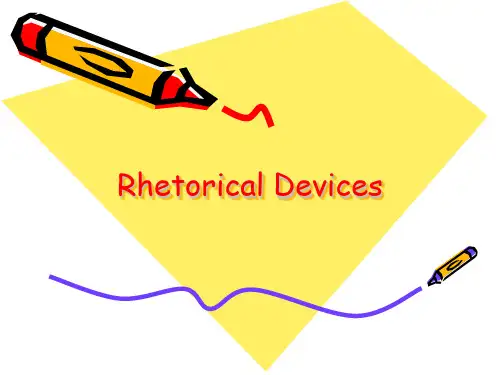
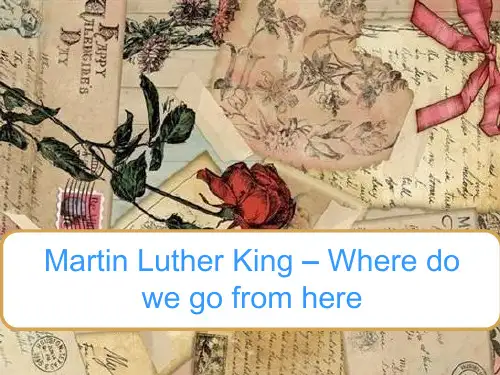
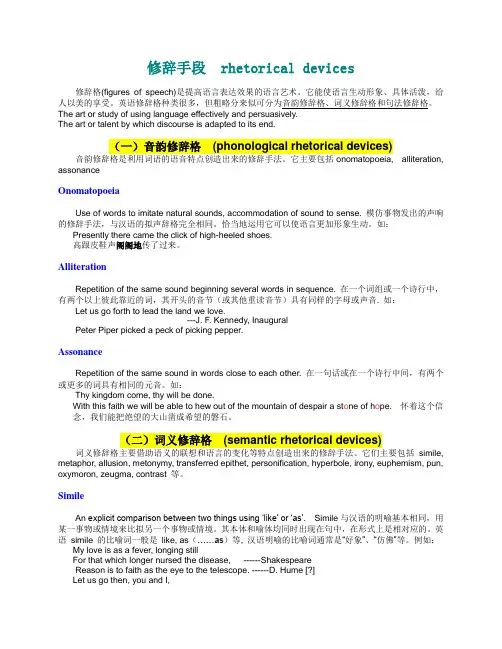
修辞手段 rhetorical devices修辞格(figures of speech)是提高语言表达效果的语言艺术。
它能使语言生动形象、具体活泼,给人以美的享受。
英语修辞格种类很多,但粗略分来似可分为音韵修辞格、词义修辞格和句法修辞格。
The art or study of using language effectively and persuasively.The art or talent by which discourse is adapted to its end.(一)音韵修辞格(phonological rhetorical devices) 音韵修辞格是利用词语的语音特点创造出来的修辞手法。
它主要包括onomatopoeia, alliteration, assonanceOnomatopoeiaUse of words to imitate natural sounds, accommodation of sound to sense. 模仿事物发出的声响的修辞手法,与汉语的拟声辞格完全相同。
恰当地运用它可以使语言更加形象生动。
如:Presently there came the click of high-heeled shoes.高跟皮鞋声阁阁地传了过来。
AlliterationRepetition of the same sound beginning several words in sequence. 在一个词组或一个诗行中,有两个以上彼此靠近的词,其开头的音节(或其他重读音节)具有同样的字母或声音. 如:Let us go forth to lead the land we love.---J. F. Kennedy, InauguralPeter Piper picked a peck of picking pepper.AssonanceRepetition of the same sound in words close to each other. 在一句话或在一个诗行中间,有两个或更多的词具有相同的元音。
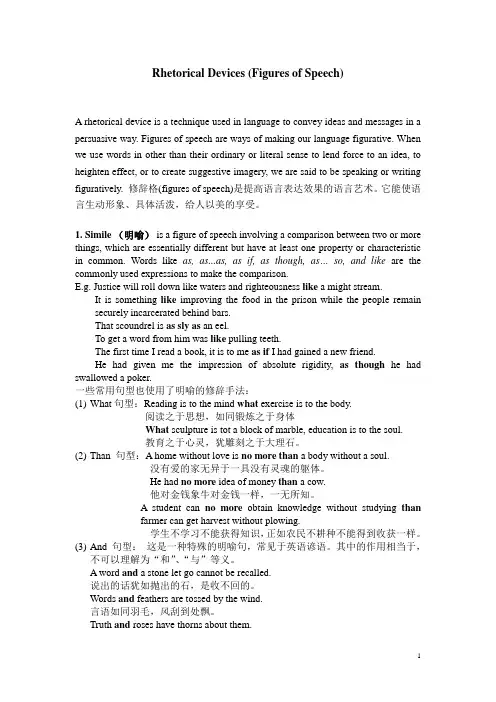
Rhetorical Devices (Figures of Speech)A rhetorical device is a technique used in language to convey ideas and messages in a persuasive way. Figures of speech are ways of making our language figurative. When we use words in other than their ordinary or literal sense to lend force to an idea, to heighten effect, or to create suggestive imagery, we are said to be speaking or writing figuratively. 修辞格(figures of speech)是提高语言表达效果的语言艺术。
它能使语言生动形象、具体活泼,给人以美的享受。
1. Simile (明喻)is a figure of speech involving a comparison between two or more things, which are essentially different but have at least one property or characteristic in common. Words like as, as...as, as if, as though, as…so, and like are the commonly used expressions to make the comparison.E.g. Justice will roll down like waters and righteousness like a might stream.It is something like improving the food in the prison while the people remain securely incarcerated behind bars.That scoundrel is as sly as an eel.To get a word from him was like pulling teeth.The first time I read a book, it is to me as if I had gained a new friend.He had given me the impression of absolute rigidity,as though he had swallowed a poker.一些常用句型也使用了明喻的修辞手法:(1)What句型:Reading is to the mind what exercise is to the body.阅读之于思想,如同锻炼之于身体What sculpture is tot a block of marble, education is to the soul.教育之于心灵,犹雕刻之于大理石。
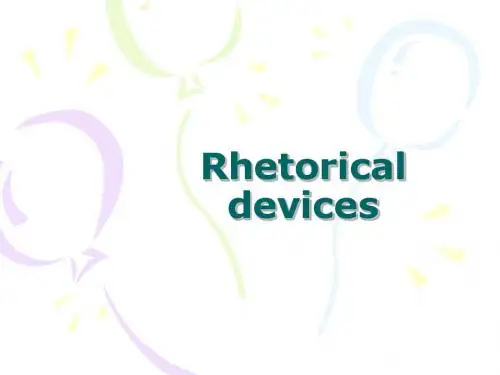
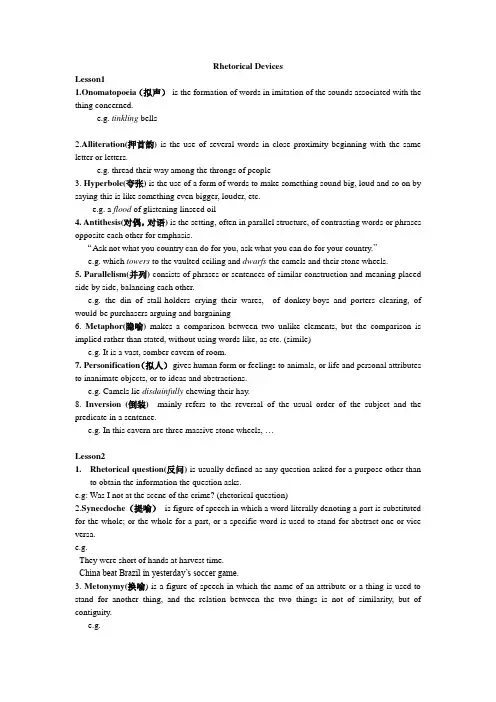
Rhetorical DevicesLesson11.Onomatopoeia(拟声)is the formation of words in imitation of the sounds associated with the thing concerned.e.g. tinkling bells2.Alliteration(押首韵)is the use of several words in close proximity beginning with the same letter or letters.e.g. thread their way among the throngs of people3. Hyperbole(夸张) is the use of a form of words to make something sound big, loud and so on by saying this is like something even bigger, louder, etc.e.g. a flood of glistening linseed oil4. Antithesis(对偶,对语) is the setting, often in parallel structure, of contrasting words or phrases opposite each other for emphasis.“Ask not what you country can do for you, ask what you can do for your country.”e.g. which towers to the vaulted ceiling and dwarfs the camels and their stone wheels.5. Parallelism(并列) consists of phrases or sentences of similar construction and meaning placed side by side, balancing each other.e.g. the din of stall-holders crying their wares, of donkey-boys and porters clearing, of would-be purchasers arguing and bargaining6. Metaphor(隐喻) makes a comparison between two unlike elements, but the comparison is implied rather than stated, without using words like, as etc. (simile)e.g. It is a vast, somber cavern of room.7. Personification(拟人)gives human form or feelings to animals, or life and personal attributes to inanimate objects, or to ideas and abstractions.e.g. Camels lie disdainfully chewing their hay.8. Inversion (倒装)mainly refers to the reversal of the usual order of the subject and the predicate in a sentence.e.g. In this cavern are three massive stone wheels, …Lesson21.Rhetorical question(反问) is usually defined as any question asked for a purpose other thanto obtain the information the question asks.e.g: Was I not at the scene of the crime? (rhetorical question)2.Synecdoche(提喻)is figure of speech in which a word literally denoting a part is substituted for the whole; or the whole for a part, or a specific word is used to stand for abstract one or vice versa.e.g.They were short of hands at harvest time.China beat Brazil in yesterday’s soccer game.3. Metonymy(换喻) is a figure of speech in which the name of an attribute or a thing is used to stand for another thing, and the relation between the two things is not of similarity, but of contiguity.e.g.The kettle is boiling.Wall Street, American financial centerCapital Hill, U.S. Congressthe Pentagon, U.S. Defense Department4. Anti-climax(渐降) is a figure of speech in which a series of ideas are arranged in such a way that they go from the most important to the least important with steady weakening of emotion and tone. It is usually used for humorous effect.e.g. He lost his empire, his family and his fountain pen.The duties of a soldier are to protect is country and peel potatoes.5. Climax(层递)refers to the arrangement of series of ideas, which go from the least important to the most important with steady strengthening of emotion and tone.e.g. Some books are to be tasted, others to be swallowed, and some few to be chewed and digested6. Euphemism (委婉语)is mild, pleasant, neutral, or inoffensive expressions used instead of harsh, blunt, coarse, or unpleasant ones. They are often used out of courtesy or consideration for other people’s feelings.e.g. pass away, go to heaven, to be gone.weight-watcher, under-achiever, perspiration, do one's business, answer the nature's call etc. Earthly care, worldly worry or concern.7.Irony (反语)is a figure of speech in which the meaning literally expressed is the direct opposite of the me aning intended and which aims at ridicule, humor or sarcasm to make one’s remarks forceful.e.g. Robbing a widow of her savings was certainly a noble act.…on the good fortune that my illness has brought me.Lesson51.Antithesis(对照; 对立; 对偶)It is a counter-propositions and denotes a direct contrast to the original proposition.Any man or state who fights on against Nazidom will have our aid. Any man or state who marches with Hitler is our foe.Rhetorical Devices in the speech•1) Periodic sentence•2) Rhetorical question•3) Parallelism•4) Inversion•5) Repetition•6) Alliteration•7) Simile•8) Metaphor•9) AntithesisLesson 61.Metaphor:...the nerves of both ... Were excessively frayed...his wife shot him a swift, warning glance.The words spat forth with sudden savagery.Her tone ...withered......self-assurance...flickered...The Duchess kept firm tight rein on her racing mind.2. Euphemism:...and you took a lady friend.3. Metonym y:won 100 at the tableslost it at the barthey'll throw the book,...4. Onomatopoeia:appreciative chuckleclucked his tongueLesson 91.Metaphor eg:Mark Twain is Mirror of America2.Metonymy eg: His pen would prove mightier than his pickax 2. Simile:Most American remember M. T. as the father of......a memory that seemed phonographic3. Hyperbole:...cruise through eternal boyhood and ...endless summer of freedom... The cast of characters... - a cosmos.4. Personification:life dealt him profound personal tragedies...the river had acquainted him with ......to literature's enduring gratitude...The grave world smiles as usual...Bitterness fed on the man...Personal tragedy haunted his entire life5. Antithesis:...between what people claim to be and what they really are...6. Euphemism:...men's final release from earthly struggle7. Alliteration:...the slow, sleepy, sluggish-brained sloths stayed at home...with a dash and daring......a recklessness of cost or consequences...8. Metonymy:...his pen would prove mightier than his pickaxe。
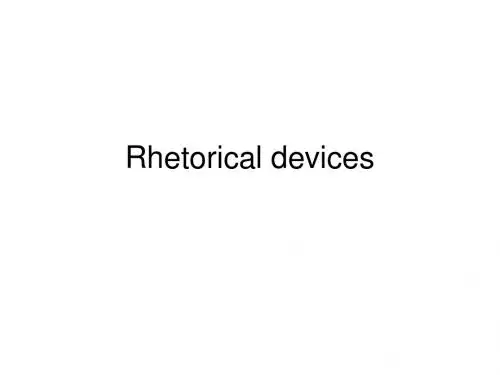
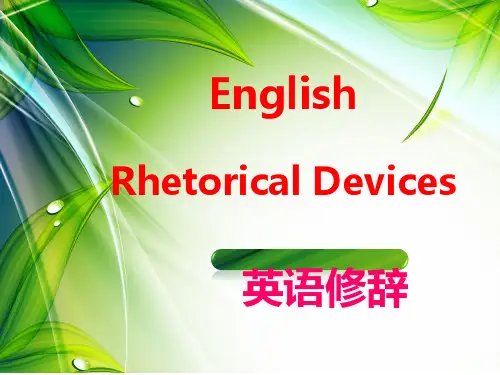
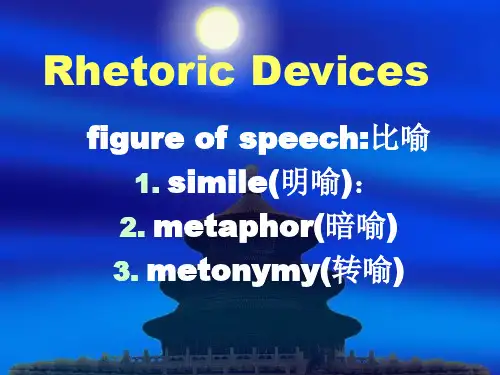
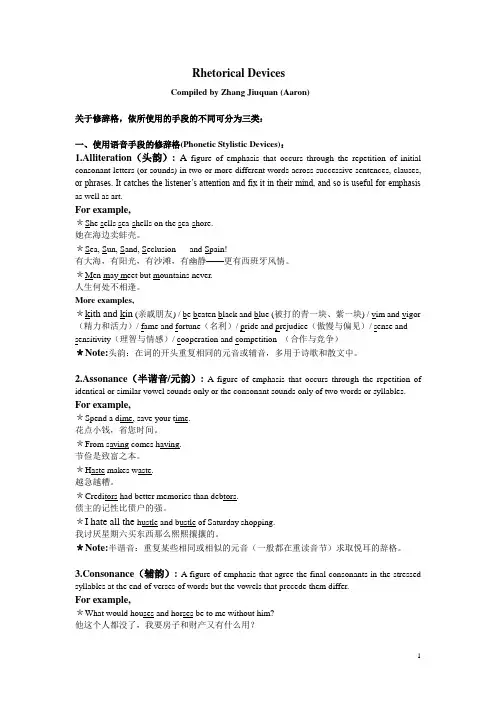
Rhetorical DevicesCompiled by Zhang Jiuquan (Aaron)关于修辞格,依所使用的手段的不同可分为三类:一、使用语音手段的修辞格(Phonetic Stylistic Devices):1.Alliteration(头韵): A figure of emphasis that occurs through the repetition of initial consonant letters (or sounds) in two or more different words across successive sentences, clauses, or phrases. It catches the listener’s attention and fix it in their mind, and so is useful for emphasis as well as art.For example,*She sells sea-shells on the sea-shore.她在海边卖蚌壳。
*Sea, Sun, Sand, Seclusion---- and Spain!有大海,有阳光,有沙滩,有幽静——更有西班牙风情。
*Men may meet but mountains never.人生何处不相逢。
More examples,*kith and kin (亲戚朋友) / be beaten black and blue (被打的青一块、紫一块) / vim and vigor (精力和活力)/ fame and fortune(名利)/ pride and prejudice(傲慢与偏见)/ sense and sensitivity(理智与情感)/ cooperation and competition (合作与竞争)*Note:头韵:在词的开头重复相同的元音或辅音,多用于诗歌和散文中。
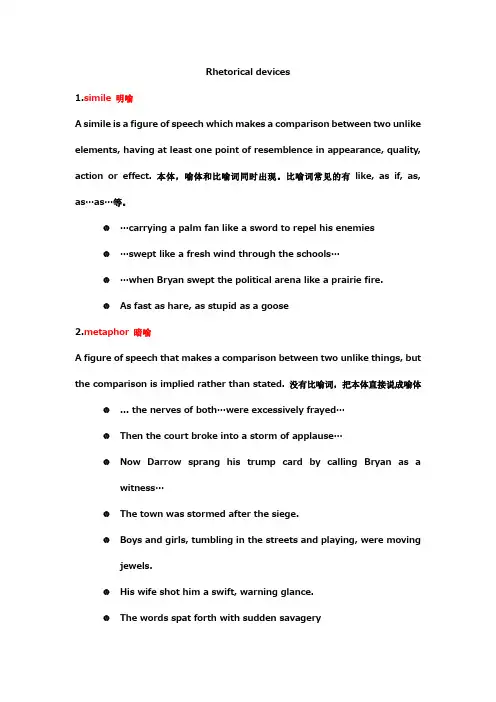
Rhetorical devices1.simile 明喻A simile is a figure of speech which makes a comparison between two unlike elements, having at least one point of resemblence in appearance, quality, action or effect. 本体,喻体和比喻词同时出现。
比喻词常见的有like, as if, as, as…as…等。
…carrying a palm fan like a sword to repel his enemies…swept like a fresh wind through the schools……when Bryan swept the political arena like a prairie fire.As fast as hare, as stupid as a goose2.metaphor 暗喻A figure of speech that makes a comparison between two unlike things, but the comparison is implied rather than stated. 没有比喻词,把本体直接说成喻体 ... the nerves of both…were excessively frayed…Then the court broke into a storm of applause…Now Darrow sprang his trump card by calling Bryan as a witness…The town was stormed after the siege.Boys and girls, tumbling in the streets and playing, were moving jewels.His wife shot him a swift, warning glance.The words spat forth with sudden savageryI’ll spell it out.Mark Twain -- Mirror of America…saw clearly ahead a black wall of night……main artery of transportation in the young nation’s heartThe vast basin drained three-quarters of the settled United StatesAll would resurface in his books… that he soaked up…My case would snowball into…Our town…had taken on a circus atmosphere.The street…sprouted with…He thundered in his sonorous organ tones.…had not scorched the infidels……after the prelimilary sparring over legalities……the filigree of the spruce treesDaughter of the forestI tried another lineA streak of amber3.metonymy 转喻A figure of speech that has to do with the substitution of the name of one thing for that of another. This substituted name may be an attribute of that other thing or be closely associated with it. A,B 两者在某一方面密切联系,提到A就会联想到B。
十种修辞手法英语作文模板## Rhetoric Devices Essay Template。
Rhetoric Devices。
Rhetoric is the art of using language effectively to persuade, inform, or entertain. It is a powerful tool that can be used to communicate complex ideas in a clear and engaging way.There are many different types of rhetoric devices, each with its own unique purpose. Some of the most common rhetoric devices include:Metaphor: A comparison between two unlike things that have something in common.Simile: A comparison between two unlike things that use the words "like" or "as".Personification: Giving human qualities to a non-human thing.Hyperbole: An exaggeration for emphasis.Understatement: A statement that is less than the truth, often for ironic effect.Rhetorical question: A question that is not intended to be answered, but rather to make a point.Parallelism: The use of similar grammatical structures to create emphasis or balance.Antithesis: The use of contrasting words or ideas to create tension or conflict.Epigram: A witty or concise statement that makes a point.Rhetorical apostrophe: Addressing an absent person or thing as if they were present.How to Use Rhetoric Devices。
An Introduction to Figures of Speech(修辞格)Rhetorical Devices(修辞手法)1. Simile(明喻)Simile is an expression of comparison between two different things. It is usually introduced by “as” or “like”, and sometimes also by “as…as/as…so”, and “resemble” as the signs of comparison.明喻就是打比方,指一事物像另一事物的修辞格。
常用的比喻词有“as”or “like”, and sometimes also by “as…so /as…as”, and “resemble”等1). Mercy drops as the gentle rain from heaven upon the place beneath.—Shakespeare2). The cheque fluttered to the floor like a bird with a broken wing.3). Self-criticism is as necessary to us as air to water.4). As a man whispers, so the breeze makes a low, hissing sound.5) Learning resembles scaling the heights.2. Metaphor(隐喻/暗喻)Metaphor contains an implied comparison, in which a word or phrase ordinarily or primarily used of one thing is applied to another. In other words, it calls one thing by the name of another or one thing is described in terms of another.隐喻是一种隐含着比喻的修辞格,它直接把一种事物比为另一种事物,不用比喻词,通常比较含蓄。
修辞方法Rhetorical Devices (2)PersonificationIt is to treat a thing or an idea as if it were human or had human qualities.1. Youth is hot and bold; Age is weak and cold. Youth is wild, and Age is tame. -----William Shakespeare2. The match will soon be over and defeat is staring us in the face.3. This time fate was smiling to him.4. Thunder roared and a pouring rain started.5. Dusk came stealthily.6. The storm was raging and angry sea was continuously tossing their boat.7. The sun kissed the green fields.8. The thirsty desert drank up the water.9. The youth were singing, laughing and playing the music instruments.10. The trees and flowers around them danced heartily as if touched by merry mood.11. The night, like some great loving mother, gently lays her hand at our feveredhead.12. Ill-gotten wealth is but an evil friend.13. The leaves are trembling in the cold wind.14. The storm was so angry that it wanted to destroy everything in the cold wind.15. The thirsty soil drank in the rain.1.The waves were dimpling in the sunshine. (泛起笑窝)2.The green mountains were dancing, and the rivers and lakes smiling.3.The rose blushes in the morning breeze.4.Time will tell.5.On the table lay some dog-eared books.6.The wind sighed in the tree tops.7.The moon is riding in the sky.8.The lamb nodded as I came home.9.Pride goes before a fall.10.Success, health, and happiness are beckoning to you.11.Poetry is the queen of arts.12.Truth never grows old.ZoosemyOpposite to personification, it is to treat a human as an object, like an animal, a plant,an inanimate thing, or an abstract idea.1. “A lucky dog you are!” exclaimed Jim.2. Terribly hungry, the man wolfed down all the cakes.3. Children are flowers of our country.4. She found in him model and admiration.5. His spoilt children are rotten goods that will never prosper.6. Like a lion he rushed to meet his foe.7. He slept like a dog.8. The prostitutes are nothing but paper toys, played, ruined, torn, and thrown into the garbage can.9. She is shedding crocodile tears.10. Children are always eager to ape others.11. He is a bookworm.EuphemismIt is the substitution of a mild or vague expression for a harsh or unpleasant one, for example:to die to pass away, to leave us, one’s heart has stopped beating, to fall asleep old people senior citizens, gray hairmad emotionally disturbedmadhouse mental hospitalwhore working girl/call girl/business girl/pavement princessdustman sanitation workerprostitutes entertainerlavatory bathroom, men’s/women’s room, dressing room, restroom, water closet Invasion, raid military actionDriving inhabitants away or controlling them pacificationconcentration camps strategic hamletsgraveyard Memorial park; memory parkFirst Class (飞机上的豪华舱) Deluxe class/ Premium ClassSecond Class The First ClassThird Class Business Class/Economic Class/Tourist Classmake love with/ have sex with go to bed with/sleep withto be pregnant to be expectingsecondhand store resale storegarbage collector sanitation engineermaid/housekeeper domestic help/day-help/live-in help1.He is a bit slow for his age. (他反应较慢)2.He/She is a stout/plump man/woman.3.I have to pay a call./ I’d like to be excused./ I have to retire for a moment./ whereis the restroom?/ may I wash hands?4.His father passed away last week and is going to be laid to rest next Sunday.5.“What do you think of the roast duck?” “Not bad.”6.Your grammar is not particularly good.7.They parted after two years of marriage.8.Sometimes I think she sticks too much to her principles.9.I am afraid he has misrepresented the facts.10.He used poor judgment wherever he went.11.He worked and worked until he breathed his last.12.They laid down their lives for their country.13. And, in being low water, he went out with the tide.It is obvious that those euphemisms used by the ordinary people are meant to soften harsh reality, but those used by politicians may aim at deceiving the public. Alliterationwith might and main 尽全力 neck and nothing 铤而走险地rough and ready粗糙但尚能用的,卤莽但还有能力的as blind as a bat 有眼无珠as large as life 与原物一般大小;千真万确bite the bullet 死撑硬挺,啃硬骨头put into practice 实行,实施1.His writing is clear and clean. trade policy is often viewed as inconsistent, incoherent and incomprehensibleto other countries.3.Time and tide wait for no man.4.He proved to be a slow, sleepy, sluggish-brained sloth.5.They got the work through with dash and daring regardless of the cost orconsequences.6.He is huge and humorous.7.She is both small and stupid.8.My father is always healthy and happy.Overstatement and understatementIn overstatement, the diction exaggerates the subject, and in understatement, thewords play down the magnitude or value of the subject. Overstatement is also called hyperbole. Both overstatement and understatement aim at the same effect: to make the statement or description impressive or interesting.1.She is dying to know what job has been assigned her.2.On hearing that he had passed the CET 6, he whispered to himself, “I am theluckiest man in the world.”3.The millionaire spent a few dollars to build this indoor pool.4.The funny stories made all the audience laugh off their head.5.His parents praised his performance to the skies.More about HyperboleThank you Thanks a millionThey laughed heartily. They almost died laughing.I am hungry. I am starving.1. From his mouth flowed speech sweeter than honey.2. So great is he that the sun’s brilliance seemed dim by comparison.3. The two sisters are different in a thousand and one ways.4. In the spring I have counted one hundred and thirty-six kinds of weather inside of four-and-twenty hours. (Mark Twain)More about Understatement1. That is no laughing matter. (That’s a serious matter.)2. She was not without ambition. (She was quite ambitious.)3. This piece of work is nothing to be proud of. (It is disgraceful.)4. Sorry, this is in fact more than I can promise. (I cannot promise.)Transferred EpithetAn epithet is an adjective or descriptive phrase that serves to characterize somebody or something. A transferred epithet is one that is shifted from the noun it logically modifies to a word associated with that noun. When one says that he has had a busy day, one is using a figure of speech. For it is the person, not the day, that is busy.“移就修饰”/“转移修饰”/“移就”。
英文修辞手法大全Rhetorical devices, also known as figures of speech, are techniques used to enhance writing and speech by adding color, emphasis, and interest. These devices help writers and speakers convey their ideas in a more engaging and effective manner. Here is a comprehensive list of common rhetorical devices:1. Hyperbole: Exaggeration used for emphasis or dramatic effect. Example: "I've told you a million times!"2. Simile: A comparison between two unlike things using "like" or "as." Example: "She's as fierce as a lion."3. Metaphor: A comparison between two unlike things without using "like" or "as." Example: "Time is a thief."4. Personification: Giving human qualities or characteristics to non-human objects. Example: "The trees whispered a secret in the wind."5. Alliteration: Repetition of initial consonant sounds in successive or closely connected words. Example: "Peter Piper picked a peck of pickled peppers."6. Assonance: Repetition of vowel sounds in successive or closely connected words. Example: "Hear the mellow wedding bells."7. Onomatopoeia: Words that imitate or suggest the sound they describe. Example: "The buzzing of bees filled the air."8. Irony: A figure of speech in which the intended meaning is opposite to the literal or usual meaning. Example: "I can't wait to spend my vacation at the dentist's office."9. Oxymoron: A figure of speech that combines two contradictory terms. Example: "Jumbo shrimp."10. Euphemism: Using a mild or less direct word or phrase in place of a more harsh or blunt one. Example: "He's in a better place" (Euphemism for "He passed away").11. Allusion: A reference to a well-known person, place, event, or literary work. Example: "She had the wisdom of Solomon."12. Repetition: Repeating the same words or phrases for emphasis. Example: "Never, never, never give up."13. Parallelism: The use of similar sentence structures or patterns for emphasis. Example: "Easy come, easy go."14. Anaphora: Repetition of a word or group of words at the beginning of successive clauses. Example: "I have a dream (I)have a dream..."15. Chiasmus: Reversing the order of words or phrases to create a contrasting effect. Example: "You can take the girl out of the country, but you can't take the country out of the girl."16. Antithesis: Contrasting or combining two opposing ideas in a balanced parallel structure. Example: "It was the best of times, itwas the worst of times."17. Metonymy: Substituting a word or phrase with a related term. Example: "The pen is mightier than the sword" (Pen refers to writing, and sword refers to military force).18. Understatement: A figure of speech that intentionally downplays the significance of something. Example: "I'm just a little tired" (after running a marathon).19. Polysyndeton: The use of several conjunctions in close succession to create an emphatic or rhythmic effect. Example: "He ran and jumped and laughed."20. Rhetorical question: A question asked for rhetorical effect, rather than to receive an answer. Example: "Do you think I was born yesterday?"Understanding and utilizing these rhetorical devices can help writers and speakers effectively communicate their ideas, evoke emotions, and leave a lasting impact on their audience. By using these techniques, one can create a more persuasive, memorable, and engaging piece of writing or speech.。